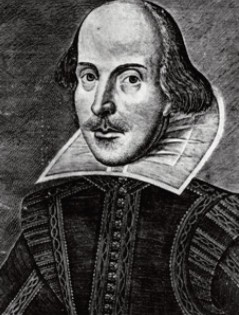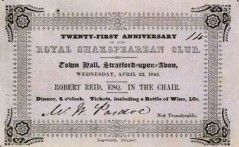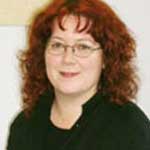  |
|
PROGRAMME DETAILS FOR THE 189TH SEASON 2012/2013
TUESDAY 15 January 2013
Karin Brown
Shakespeare Institute Librarian,
University of Birmingham

Karin Brown is the Shakespeare Institute Librarian, University of Birmingham. She has an MA(Hons) degree in English Literature and Language, 1991, University of Aberdeen. PGDip in Librarianship and Information Science, 1994, Robert Gordon’s University. Her current responsibilities involve the day-to-day running and future planning of the Shakespeare Institute Library. In the last few years Karin has lectured on Richard III in Performance, Folklore in Shakespeare, The Gothic World of Bram Stoker and Henry Irving; The Rough Magic of Henry Irving , Shakespeare and Witchcraft, Kurosawa’s Shakespeare.
Her publications include RSC Complete Works project with the University of Warwick: performance histories covering 22 of Shakespeare’s plays as performed by the RSC. First four published in 2008: Hamlet, Richard III, the Tempest, Midsummer Night’s Dream. She is a regular contributor to First Knight: the Journal of the Henry Irving Society.
Karin is currently working on MPhil(A) with the Department of American and Canadian Studies on Fantasy and Politics in Contemporary Spanish and Mexican Cinema.
What A Performance! The Interpretation Of Theatrical Evidence
Lecture Notes
The 875th meeting of the Shakespeare Club took place at Mason Croft on Tuesday 15 January 2013. Karin Brown, Librarian at the Shakespeare Institute, chaired by Sylvia Morris, drew on professional experience and personal research in her talk. What a Performance: The Interpretation of Theatrical Evidence.
Defining theatre history as beginning when the last performance ends, Ms Brown raised some of the challenges involved. For example, how could a production be captured when actor improvisation and audience response might vary in each performance. And that difficulty was compounded for historical production, when archives came into play to fit together the pieces between process and performance via historiography. Archival objects were the portals to the past.
Ms Brown argued that theatre research was a form of detective work in which it was wise never to trust a single source of evidence. Posters, promptbooks and photographs all had a role in reconstructing a production, but documents only responded to the historian’s questions and a personal perspective had to be brought to bear.
Using Peter Brook’s 1962 King Lear as an example, Ms Brown showed how reviews, programmes, photographs and cuts in the performance text evidenced by the promptbooks could be used to construct one of the most influential postwar productions of the play. Ms Brown had contributed twenty two stage histories to the RSC single editions of Shakespeare’ plays and offered some of her observations on those plays, particularly those which appealed to her own interest in the Gothic.
Her current project was a virtual theatre archive, a collaboration between the V&A, the Garrick Club, Birmingham Shakespeare Library and the Regent’s Park Open Air Theatre to pull together records from UK and international collections. The past was unrecoverable but a virtual archive would help, Ms Brown suggested, to harvest the available evidence for historians.
After questions from the audience the meeting finished at 9.10pm.
CLICK TO GO BACK TO MAIN PROGRAMME LIST
|




